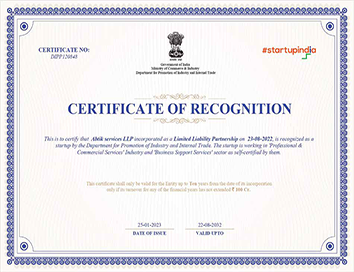Startup India Certificate Benefits
- 3 Year Income Tax Exemption
- Access to Funding
- Government Tenders
- Cloud Credits
- Trademark And Patent
Startup India Certificate Benefits, Eligibility Criteria, Documents Required, Process
The Startup India Certificate is more than just a piece of paper. It symbolizes a significant milestone in the journey of any startup. Not only does it provide recognition and credibility, but it also opens up a world of benefits and opportunities for budding entrepreneurs.

Enjoy Your Startup Journey
Startup India Certificate
What is Startup India Certificate?
The Startup India Certificate is a recognition granted by the Department for Promotion of Industry and Internal Trade (DPIIT) to startups that meet certain criteria. This recognition provides startups with various benefits, including tax exemptions, patent filing assistance, and easier access to funding. To be eligible for recognition, a startup must be a private limited company, partnership firm, or LLP that has been incorporated in India for less than 10 years and is working towards innovation, scalability, and employment generation
Startup India Certificate Benefits
Registering for a Startup India Certificate offers several benefits to entrepreneurs and startups in India. Here are some of the key advantages:
- Tax Exemption: If your company was incorporated between April 2016 and March 2021, your company is a private limited or LLP, and you have a Startup India certificate. You become eligible to apply for tax exemption, and if the government approves your application, they will provide you with a Certificate of Eligibility. Based on this certificate, you can avail tax exemption benefits for any three consecutive years.
- Access to Funding: Government funding available wherein you can get a loan of up to 2 crores without mortgage under the GSTME scheme. In this too, startups get first priority, and there are related norms to be followed since you are a startup.
- Government Tender: If you have Startup India Certificate and you want to participate in Government tenders, you won’t have to pay the earnest money deposit (EMD), and you won’t need to show turnover or experience. This means you get 100% relaxation from the government, and you’ll also get first priority in government tenders.
- Cloud Credits: Cloud credits avail ranging from $1000 to $5000 for every certified startup company, and it’s completely free of cost. These credits can be used for data storage, online marketing, and web hosting. You can claim these credits after receiving the Startup India certificate, and you can use them free of cost for a year.
- Trademark & Patent: If you have a Startup India certificate and you want to apply for a trademark or patent, the government covers advocate charges or consultancy fees on your behalf, and your trademark or patent application will be fast-tracked, processing 30% to 40% faster.
Eligibility of Startup India Certificate
To be eligible for Startup India Certificate, applicants typically need to fulfill 3 primary criteria.
- Type of Entity: The startup must be registered as a Private Limited Company under the Indian Companies Act, 2013, a Limited Liability Partnership (LLP) under the Indian Limited Liability Partnership Act, 2008, or a partnership firm under the Indian Partnership Act, 1932.
- Annual Turnover: Another requirement is that the turnover of your company should not exceed 100 crores.
- Incorporation Period: For recognition under the DPIIT Startup India initiative, the entity must be incorporated for a period not exceeding 10 years from its date of incorporation.
Documents Required For Startup India Certificate
- Incorporation Certificate of Startup
- Company Pan Card
- Director Aadhar Card
- Organization DSC Class3
- Email id
- Contact no.
Do You Want
Startup India Certificate?
Abtik can help you. We help Startups with the recognition process. Book A Call for quick inquiry.

The process — Startup India Certificate.
FAQs
Investing in startups is a risky proposition, but the low requirement for overhead capital combined with high upside potential makes it lucrative for investors to put their bets on startups.
The Thomson Reuters Venture Capital Research Index replicated the performance of the venture capital industry in 2012 and found that overall venture capital has returned at an annual rate of 20% since 1996—far outperforming modest returns of 7.5% and 5.9% from public equities and bonds, respectively.
